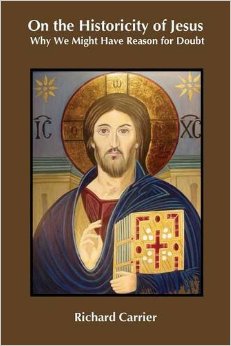For an annotated list of previous posts in this series see the archived page:
Daniel Gullotta’s Review of Richard Carrier’s On the Historicity of Jesus
After setting aside a discussion of Richard Carrier’s Bayesian method as “unnecessarily complicated and uninviting” (p. 325) and opting instead to focus on six points in Carrier’s argument, Daniel Gullotta concludes:
After examining numerous fundamental problems with Carrier’s overall thesis for Jesus’ non-historicity, Carrier’s final Bayesian conclusion that ‘the odds Jesus existed are less than 1 in 12,000’ is untenable and disingenuous.
Gullotta, p. 344
That statement is misleading insofar as Gullotta has not addressed Carrier’s “Bayesian conclusion” at any point in his review. (Gullotta has not even addressed the Bayesian method except to compare it, misguidedly, with Richard Swinburne’s “use” of Bayes to prove Jesus’ resurrection.) One might infer, then, that the six points of Gullotta’s focus were “fundamental” to “Carrier’s overall thesis for Jesus’ non-historicity”, yet we have seen in the previous posts that such a suggestion seriously misunderstands (ignores) both Carrier’s Bayesian argument and the weight that Carrier himself assigned to those six points. Far from being “fundamental problems” we have seen that Gullotta’s
* Had a review addressed Carrier’s Bayesian method it would have acknowledged that this claim was but one of nearly 50 data points of background information and not a point of primary evidence to be assessed in the light of competing hypotheses;
** Had the discussion addressed the Bayesian analysis it would have informed readers that yes, Paul’s claims can be used to argue strongly for Jesus’ historicity, but that the competing hypothesis also needed to be addressed along with all other related evidence and the two hypotheses then weighed against each other.
1. focus on Carrier’s claim that a pre-Christian angel named Jesus existed erroneously shifts one of nearly 50 background data points, a point that is quite dispensable without any significant loss to Carrier’s argument, into a “fundamental” plank of Carrier’s argument;*
2. focus on his understanding of Jesus as a non-human and celestial figure within the Pauline corpus inexplicably failed to acknowledge that Carrier conceded the argument that Paul’s claim that Jesus was born of a woman was 100% expected in the argument for historicity, that Carrier argued a fortiori giving here the highest score in favour of Jesus being historical;**
3. focus on his argument that Paul understood Jesus to be crucified by demons and not by earthly forces demonstrated that he, Gullotta, lacked awareness of the range of scholarly views on this question, and in particular on the competing interpretations of the critical passage in 1 Corinthians;
4. focus on his claim that James, the brother of the Lord, was not a relative of Jesus but just a generic Christian within the Jerusalem community inexplicably failed to acknowledge that Carrier conceded the argument that Paul’s claim to have met the brother of the Lord was 100% expected in the argument for historicity, that Carrier argued a fortiori giving here the highest score in favour of Jesus being historical;**
5. focus on his assertion that the Gospels represent Homeric myths, inexplicably failed to acknowledge that Carrier made far more detailed and comprehensive arguments that the gospels were, as Gullotta himself seemed to acknowledge, primarily based on a “midrashic-like” retelling of stories from the Jewish Scriptures and emulation of Jewish heroes from those scriptures;
6. focus on his employment of the Rank-Raglan heroic arche-type as a means of comparison demonstrated Gullotta’s (a) contradictory arguments, (b) ignorance of what folklorists themselves have said and demonstrated about the function of, and ways to use, the RR archetypes, and (c) inexplicable failure to acknowledge Carrier’s points about the use and significance of the RR scale.
 Surely, then, Gullotta has not “examined numerous fundamental problems” with Carrier’s thesis nor has he addressed (in fact he has consciously avoided) Carrier’s “Bayesian conclusion”.
Surely, then, Gullotta has not “examined numerous fundamental problems” with Carrier’s thesis nor has he addressed (in fact he has consciously avoided) Carrier’s “Bayesian conclusion”.
Gullotta has failed to address what he began by acknowledging was the fundamental point of Carrier’s argument:
Simply put, the main objective of Carrier’s work is to test the ‘historicity hypothesis’ against the ‘myth hypothesis’, and after calculating the background knowledge, prior probability, as well as the evidence from the primary and secondary sources related to Jesus’ historicity, see which one seems more probable.
(Gullotta, p. 321)
- With respect to points #2 and #4 above Gullotta had two excellent opportunities to address that “main objective” but failed to do so.
- With respect to #1 Gullotta failed to take into account Carrier’s “main objective” and the place of nearly fifty points of “background knowledge” in that objective.
- With respect to #3 and #6 our reviewer’s discussion lacked awareness of the wider scholarly views, firstly within biblical studies and secondly in an external field.
- With respect to #5, Gullotta simply failed to notice about forty pages of argument belying his criticism and confused Carrier’s primary thesis with that of Dennis MacDonald, criticizing Carrier for points he nowhere makes.
A final irony
Daniel Gullotta damns Richard Carrier with faint praise when he implies at the end that Carrier’s criticisms of the methods of historical Jesus scholars are well-known in the field and that Carrier’s “contribution” was therefore superfluous. Continue reading “Gullotta’s Concluding Comments on Carrier’s On the Historicity of Jesus“
